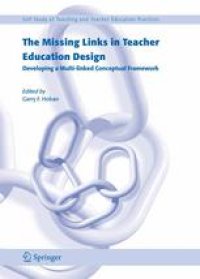
Ebook: The Missing Links in Teacher Education Design: Developing a Multi-linked Conceptual Framework
- Tags: Education (general), Teacher Education, Learning & Instruction
- Series: Self Study of Teaching and Teacher Education Practices 1
- Year: 2005
- Publisher: Springer Netherlands
- Edition: 1
- Language: English
- pdf
Why do many beginning teachers not cope with the reality of schools? Why do beginning teachers often revert to conventional teaching methods when they hit the classroom? Why do 30% of new teachers leave in the first five years? At the beginning of the 21st Century we need a better way of educating preservice students by using a program design that mirrors how to best learn about teaching and portrays it as a complex profession.
This book does not promote one particular teacher education design, but rather how to think about it. Key to such thinking is considering teacher education design as a combination of links, not independent elements to promote quality learning by preservice teachers. The four key links considered in this book include conceptual links across the university curriculum, theory-practice links between school and university settings, social-cultural links amongst the participants and personal links that shape the identity of teacher educators. Collectively, these are the missing links of teacher education design.
This ground-breaking, internationally oriented book brings together a number of excellent contributions on new directions in the design of teacher education programs. Moreover, the ideas are connected through a clear and stimulating conceptual framework that has the potential to guide effective innovation in the field.
Fred A.J. Korthagen
Professor, Utrecht University, The Netherlands
Teacher education program design demands a conceptualization built on strong interlinked foundations so that coursework and practice complement each another as a dynamic whole. Hoban offers an outstanding explication of exactly that through his Missing Links in Teacher Education. In so doing he offers a way of enhancing the quality of teacher education programs for those scholars passionate about, and committed to the work of teaching and learning about teaching. The Missing Links offers a provocative challenge to all involved in teacher education program design.
John Loughran
Foundation Chair, Curriculum & Pedagogy
Monash University, Australia
Why do many beginning teachers not cope with the reality of schools? Why do beginning teachers often revert to conventional teaching methods when they hit the classroom? Why do 30% of new teachers leave in the first five years? At the beginning of the 21st Century we need a better way of educating preservice students by using a program design that mirrors how to best learn about teaching and portrays it as a complex profession.
This book does not promote one particular teacher education design, but rather how to think about it. Key to such thinking is considering teacher education design as a combination of links, not independent elements to promote quality learning by preservice teachers. The four key links considered in this book include conceptual links across the university curriculum, theory-practice links between school and university settings, social-cultural links amongst the participants and personal links that shape the identity of teacher educators. Collectively, these are the missing links of teacher education design.
This ground-breaking, internationally oriented book brings together a number of excellent contributions on new directions in the design of teacher education programs. Moreover, the ideas are connected through a clear and stimulating conceptual framework that has the potential to guide effective innovation in the field.
Fred A.J. Korthagen
Professor, Utrecht University, The Netherlands
Teacher education program design demands a conceptualization built on strong interlinked foundations so that coursework and practice complement each another as a dynamic whole. Hoban offers an outstanding explication of exactly that through his Missing Links in Teacher Education. In so doing he offers a way of enhancing the quality of teacher education programs for those scholars passionate about, and committed to the work of teaching and learning about teaching. The Missing Links offers a provocative challenge to all involved in teacher education program design.
John Loughran
Foundation Chair, Curriculum & Pedagogy
Monash University, Australia